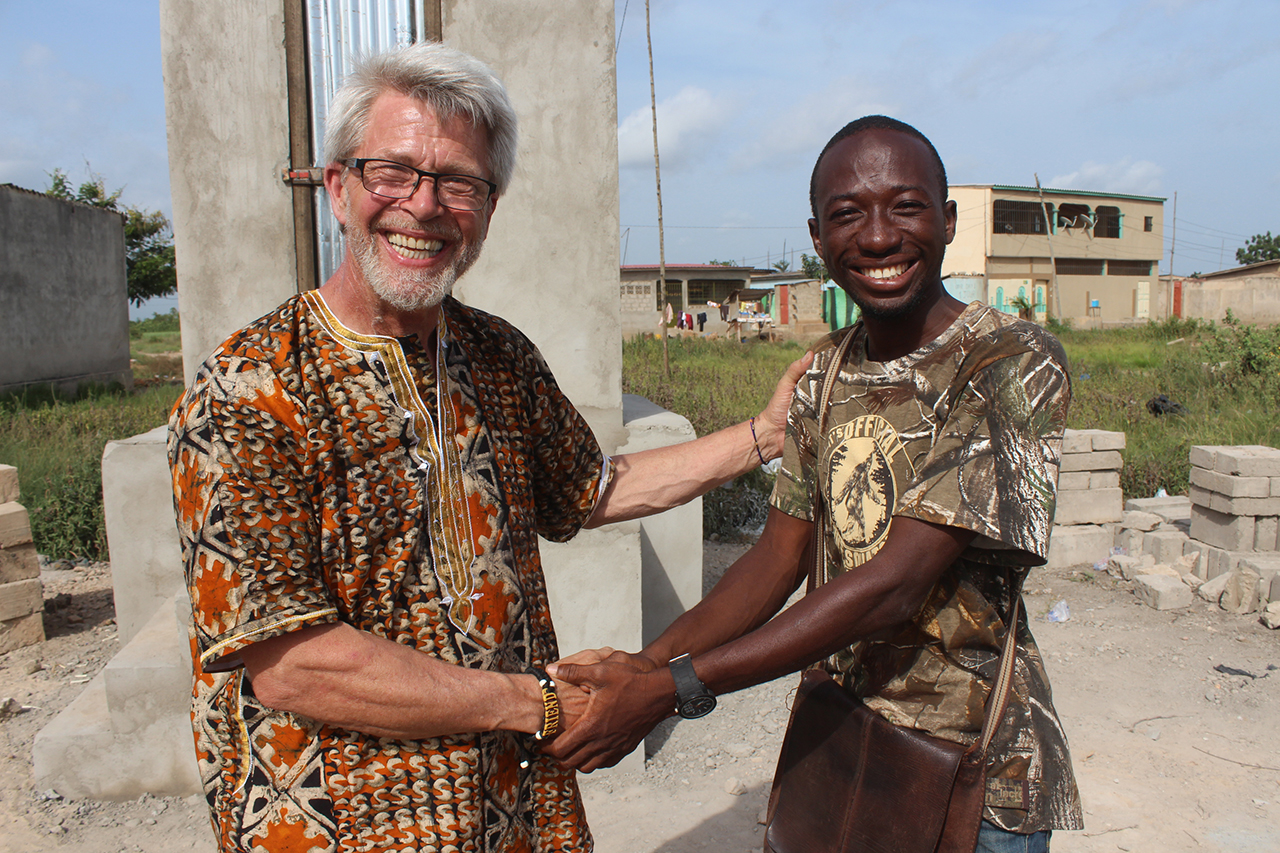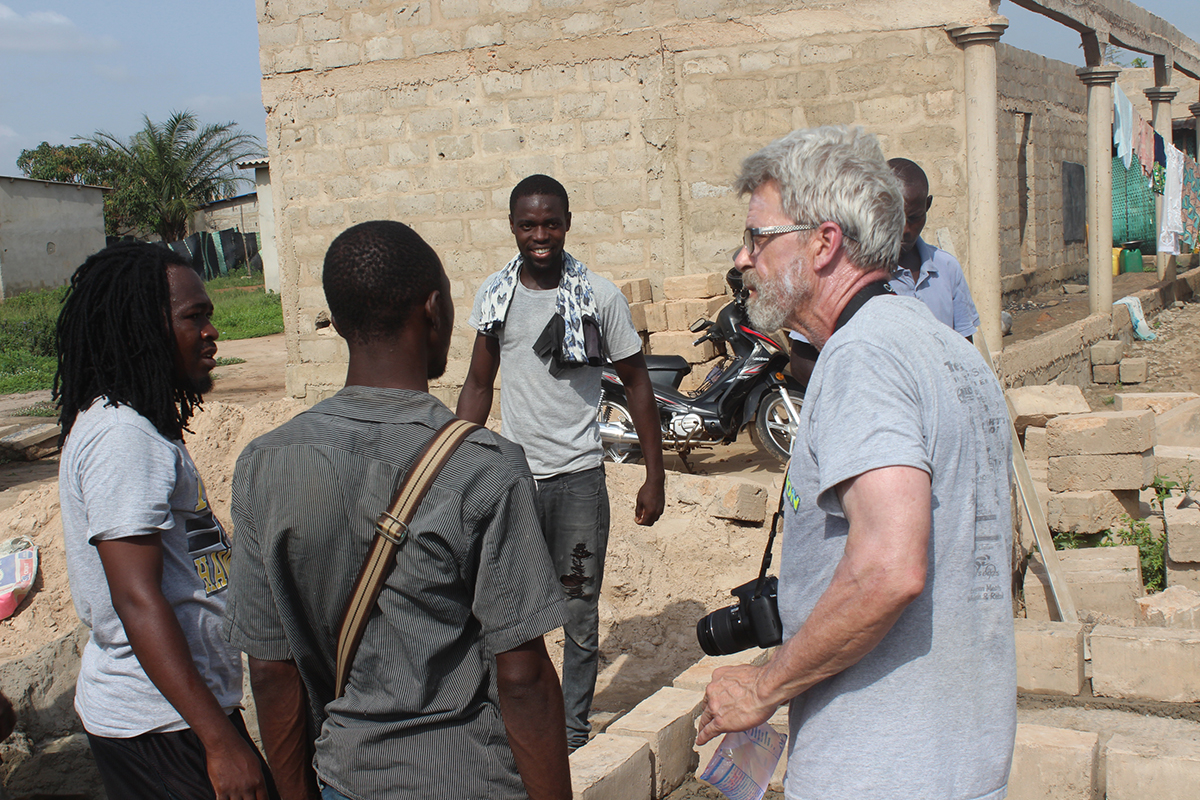

BY DOC REISS
It was a late October afternoon that found Taouvik and me walking to a café in the village of Zogbedgi, Togo.
There are no sidewalks in Zogbedgi and the expanse of dirt that lies between the buildings can barely be called a street if one is referring to motorized traffic. Even motorbikes find it difficult navigating the ruts, potholes, and near-craters of the former road. There are no road repair crews save for the village residents, most of whom work. As dire as the roads are, the villagers know no one can stop the rains -- nor the heavy trucks that ply their way through the bog leaving new obstacles in their wake. Despite the roads, Zogbedgi is a beautiful village and filled with people multi-generational families, folks moving in, young families beginning on their own. Some work in the village and some in the nation’s capital about 8km away. Like people everywhere, they have their hopes and ambitions. Some have electricity. Some don’t. Running water is if you have an elevated storage tank above your house. Most don’t. The water table is about six to eight feet down if you are planning to dig a well. The village is close to the ocean that the water is salinated. So well water is used to bathe and wash clothing. People buy government water to drink.
All of them strive to live productive lives. And almost no one has a toilet.
That was how it was . . . until 2014. That’s when the Dignity Toilets project had its birth. It didn’t start as a project. There was no lofty ideal or philanthropic challenge that brought it about. It started with a conversation between friends. Taouvik and I had met on a website for people who want to practice language. Togo was a French colony until its independence in 19XX so Tao, and everyone else in Togo, grew up speaking French. He also speaks the local languages. He taught himself English and loves Shakespeare. We had been talking for about three years and he had never uttered a less-than-positive word. He was always optimistic and upbeat.
One day he said, “Sometimes I get so tired of going to the bushes.” I asked what he meant and he explained that almost everyone in the village had to go to a field to go to the bathroom.
Further talking taught me that the village flooded frequently, which ruled out septic systems or even latrines. I asked if Tao had ever heard of a self-composting toilet. He had not. We each agreed to do research and compare notes. I found one that was made of plastic and cost $1100 without shipping. Tao had a friend whose father found a design done by the Togolese government for one made of cement. Taouvik is trained in concrete construction and took on the project. I agreed to fund it. Over the course of about a month it came together, the first of its kind in the village. It was a side-by-side squat toilet with two waterproof chambers, each covered by a large metal plate in the back. It wasn’t long before someone asked Tao how they could get one for their family. Other requests followed shortly.
Tao said he walked out of his house one morning and found people waiting to ask him to be put on the list of waiting families. Tao asked me what we might be able to do. In Togo, families used to be large because lifespans were fairly short; however, medical advances have lowered child mortality rates in the last fifty years and now Togo finds itself with an abundance of adults in their mid-twenties to mid-thirties, all scrambling for employment. Tao would occasionally find day labor on a construction job. When it was over, he would be back looking for work. He was so desperate to make money and help his family that just in the time that I had known Taouvik, he had been the victim or near victim of three employment scams. The last was a company that had not paid him in two months but promised they would just as soon as they made a profit.
I decided I would employ him and have him set up a company.
He established the bank accounts and began to study the original construction plans for ways to economize. Once we had modified the plans to make the toilet more affordable without sacrificing function, Tao began interviewing families. Each family selected had to participate in some manner. Cement is a national product and most families build with it. Many times there would be leftover building materials; : bricks, gravel, and sand. So families using leftover materials as part of their contribution became a common way for us to keep costs down. If the family did not have a certain level of materials, they would also provide labor and some times the women would make food for the crew.
Over the course of the next two years, Tao taught two other people the process and, working with a bricklayer, built a total of eight toilets.
By that time the design had been honed, and the process was established and able to be duplicated. One day I asked Tao, “What difference has having a toilet made for your family?” He replied, “It has brought us dignity.” And thus began “Dignity Toilets for Togo.,” In February of 2017, the Nor’Wester Rotary Club of Port Angeles, Washington agreed to help sponsor the project through a club foundation grant and with the opportunity for a district grant as well. By October of that year, Dignity Toilet number 23 was being built. I went to Togo to see the project firsthand. The Rotary Club had been collecting donations and sending money to Taouvik from estimates he was providing. He would deposit the funds into the account and provide receipts for the expenses. By October there were two crews working and the project was employing six people and four subcontractors.
“You know what the difference is between you and other groups or organizations that come through here?” Tao asked as we walked along. I shook my head. “They do things for the village. You do things with the village.”
Each Dignity Toilet (DT) removes people from the fields. It removes fecal matter contact from insects, animals and other humans. It keeps feces out of the ground water, creating a more sanitary environment and a healthier population. It provides safety for women and children from insects like scorpions and ants or animals and reptiles. And it allows people dignity. It also feeds the local economy with the purchase of materials and services, as well as paying wages for labor.
Dignity Toilets began looking for local support to grow the project.
When Tao first approached another service club in Togo to see if they would help out, he was told, “Well, if you were building a school, or maybe digging a well, or something like that, we would want to help out. But you are just working with families. That’s too small.” I pushed Tao, saying that if we could not find a non-profit in Togo to help, then Dignity Toilets needed to become one itself. So Taouvik and Kassim, the second member of the crew and Justin, the third, came on board, got all the paperwork and researched how to fill out all the forms. Then they took it all to the government offices to register. “Well, if you were building a school, or maybe digging a well, or something like that, we would register you,” said the bureaucrat, “But you are just working with families. That’s too small.” The district of Keuge has five villages under the jurisdiction of a local magistrate called, “The King,” Zogbedgi being one of them. I was given an audience with him and through an interpreter explained our situation. In the end, he agreed to help get the paperwork through and we agreed to work in all five of his villages.
And that’s pretty much it. We are a small project: very efficient, economical, and transparent in all expenses. In order to keep going, we need your help.
We would like to expand and help other communities and other areas. For that we are going to need lots of support. In the country of Togo alone, there are an estimated 3.5 million people without a toilet. That is a lot of families. We can’t help them all, but we are doing what we are able. At this writing (March, 2019) we have taken over one-third of the village out of the bushes and are working in a second village (Klobatem) as well.
Any contribution you make to Dignity Toilets for Togo will be used 100% for this project.
The Nor’Wester Rotary Foundation is a registered non-profit (501 (c) 3) organization. Your contribution should be tax deductible in the United States. Please give what you can. We spend an average of $400 to build a Dignity Toilet. Whatever you give will help change a family’s future, help improve life in the village and help clean up the earth. Your contribution will make a difference.
Thank you!
Contributions can be made via a link here or can be mailed to Rotary Foundation, POB 176, Port Angeles, Washington, 98362, USA